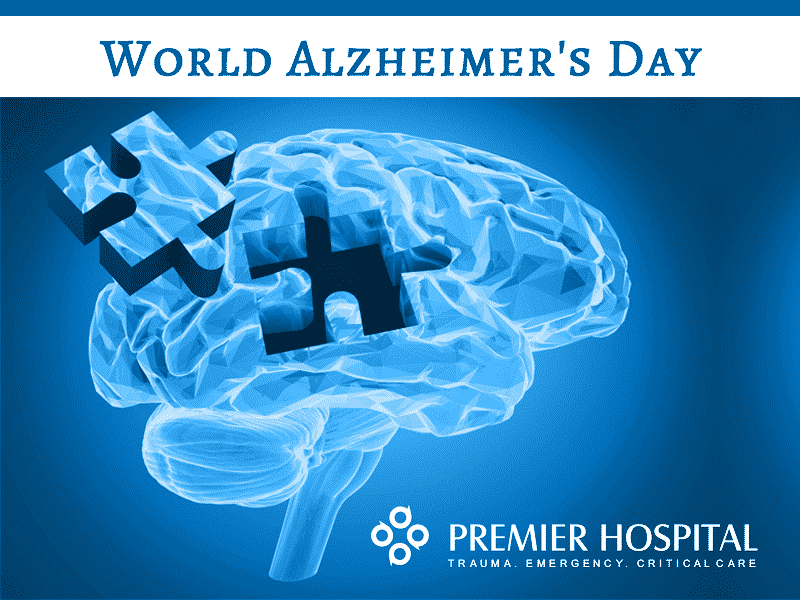Alzheimer’s Disease – Forgetting to Remember
by Premier Hospitals | September 20, 2018 |
Age is not a number, but a state of mind. Or so the saying goes. As you age, there are many external and internal factors which might occur to your body, ultimately affecting your state of mind and also your quality of life.
An injury to the brain or a disease inside it, can negatively affect your brain to a great extent resulting in various conditions, mainly dementia. Dementia is a degenerative condition where brain injuries or diseases affect your memory, thinking and also your behaviour. It has a potential to permanently harm your life and its quality. Alzheimer’s disease is a progressive form of dementia.
 Statistics show that, of those suffering from dementia, around 60%-80% progress to Alzheimer’s disease and it mainly affects people who are above the age of 65.
This World Alzheimer’s Day which is recognised on the 21st of September, 2018, doctors and hospitals will come together to create awareness about this condition and how people suffering from it can be understood and helped.
How does one know if they have Alzheimer’s disease?
Statistics show that, of those suffering from dementia, around 60%-80% progress to Alzheimer’s disease and it mainly affects people who are above the age of 65.
This World Alzheimer’s Day which is recognised on the 21st of September, 2018, doctors and hospitals will come together to create awareness about this condition and how people suffering from it can be understood and helped.
How does one know if they have Alzheimer’s disease?
- Memory loss which affects their daily activities
- Having trouble with performing familiar tasks, such as using a microwave or operating a remote.
- Difficulties when it comes to problem-solving
- Speech or writing difficulties
- Disorientation about time or places
- A decrease in judgement
- Lesser interest in personal hygiene
- Mood swings with personality changes
- Withdrawal from people
The stages of Alzheimer’s are 7 in number and in each stage, the conditions worsens with time. However, with the help of therapy, the disease can be controlled or made to progress slowly but there is unfortunately no cure for this disease yet.
 The stages of this disease are:
The stages of this disease are:
- Stage 1: In this stage there are no symptoms, but there might be an early diagnosis based on family history.
- Stage 2: One of the earliest symptoms is seen in this stage which is forgetfulness.
- Stage 3: In stage 3, signs of mild physical and mental impairment start showing, such as comparatively reduced memory and concentration. These symptoms might only be noticeable by someone close to the person.
- Stage 4: This is the stage when Alzheimer’s is most often diagnosed but it is still considered as mild. Memory loss and the inability to perform everyday tasks can be seen to a greater extent.
- Stage 5: Moderate to severe symptoms forces the person to require help from close people, in this stage.
- Stage 6: Here, a person with Alzheimer’s might need help with the most basic tasks, such as eating and putting on clothes.
- Stage 7: This is the most severe and is known as the final stage of Alzheimer’s. There might be a loss of speech and facial expressions.
A person's family history, the various health conditions they might be having now or had before in the past, the medications they take now or might have taken before and also their daily lifestyle and diet, are some of the factors which play an important role in diagnosing this condition.

The various tests which are used to diagnose this condition are an MRI scan, a CT scan and also a PET scan where each of these scans help to determine certain factors which might lead to an onset of this condition.
Treating Alzheimer’sFirstly, if you know someone who has this condition, be patient, caring and understanding with them, as they are equally frustrated about needing external help in doing the tasks they they were independently capable of doing before. Your impatience can make it worse for them.
Apart from the medication, there are also various tasks which can be given to the patient to be positive. So on this day, it is important to raise awareness about this disease and if you feel you or someone you care for is experiencing any of these symptoms, visit us at Premier Hospitals, so that we can help you recognise it and get through it. About The Hospital: Since the inception of Premier Hospital in 1991 till today, we have grown to unprecedented levels, due to our excellence in medical sciences and healthcare. Premier Hospital is the creation of Dr Mahesh Marda and when it was first established, was only a small, 30-bed hospital facility. Back then, we provided only secondary care to patients, but that certainly has changed in the present landscape.


















